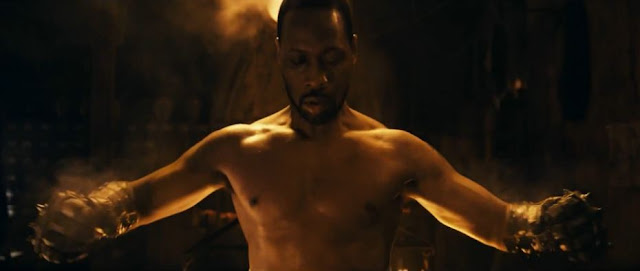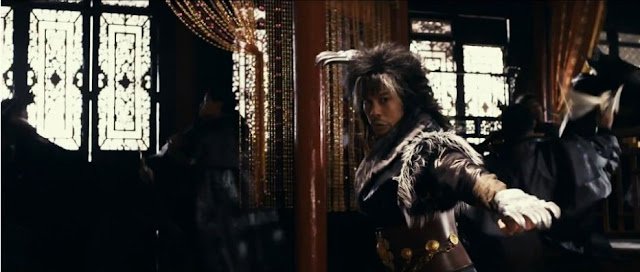"The Chinese have a saying, 'dangerous men will meet in our streets' and so it was."
The Man with the Iron Fists (2012) is a loving tribute to the martial arts and kung fu films of the 70s, this is the premiere directorial (and dream) project of RZA leader of popular rap group The Wu-Tang Clan, he writes directs and stars in this film. The film follows three different kung fu heroes who must team up to stop the traitorous Silver Wolf and his friends from stealing a large amount of gold.
This movie is packed with references to old Shaw Brothers films, so if you’re a fan of that stuff this is the movie you’ve been waiting for. And they are all incorporated well enough and convincingly that they meld well with this story and I don’t think any of them really seemed out of place to me.
Another strong point of this film is each of the characters seemed really “epic.” This is a rather standard practice in the old kung fu films, each character needs a really epic introduction and seem very powerful and menacing. This film does a very good job at replicating this and each of the characters RZA creates not only seem strong and powerful and unique but I feel like for the most part they could fit right along with all the crazy characters from kung fu films in the 70s.
Unfortunately I felt the “world” of The Man with the Iron Fists was a bit confused. It seems like standard China from any martial arts film (wacky or otherwise) but the Blacksmith character (played by RZA) is in it for some reason. He doesn’t act, dress or talk like the other characters in the world. Eventually why he's there is explained but for the first half of the film all you get is “he’s not from around here.” Russel Crow’s character gets a decent enough introduction (though another world nitpick, how come Lucy Liu speaks Chinese originally (subtitled!) and then switches to English? Doesn’t everyone speak "English for Chinese" or does everyone in this mystical China actually speak English for some reason? The biggest problem with this is no one would notice or think twice if you just kept it all in English, but having some parts subtitled just makes it confusing and calls attention to it! But overall it felt like it was really weird that this world is basically typical Ancient China from numerous kung fu films but then there’s one black dude and a couple white dudes that really stick out, no one seems to know why they're there, and no one seems to think anything weird of it. I think if I was presenting this story I would have gone for a more diversified world, where all these different “cultures” are living together in one place (you know like a fantasy story allows). Like I said, they do get around to explaing how the Blacksmith got there and his backstory which I was okay with but the big wrestler guy Brass Body is left as an anomaly, and his power’s never explained either for that matter… how did he get his tattoos and nose piercing when it seems like he can’t control it (his "power" seems like a reflex) but I guess I'm just being nitpicky wanting to know what's the deal with one of the main villains who isn't anything like any of the other characters?
This film is almost too truthful to the old kung fu films (similarly to Tarantino’s Jackie Brown), in that the plot is WAY too complicated. First off there’s way too many characters, it’d be fine to have three separate heroes but then there’s a ton of different villains and all of their partners/allies/henchmen (did bronze Lion actually end up doing anything?) and all the other (supposedly) good guys that the villains kill. This is all way too convoluted and could have been done a lot simpler. The film starts with a good 15 minutes of pure backstory exposition recited in voice over!! I feel like RZA though he’d only get once chance at this so he wanted to make it as epic as possible, but did he really think he’d be able to do a 4 hour film or something?!
On top of all that it seemed to me like a lot of the specific plot points could have been done better: we’re meant to think it’s a horrible thing that the Blacksmith lost his arms, but he’s was already planning on quitting the life and leaving with his girl for the entire first half of the movie! This weakens the effect of an iron worker losing his ability to work big time! Also there’s a point near the end where we’re supposed to feel sorry (and it’s set up to be very dramatic) for these whores who are being abused and taken over by bad guys who are hiding out in their place (whores in distress). But first thing, THEY’RE WHORES and second Russel Crow’s character’s introduction was doing that same exact thing, abusing whores! Probably worse! And yet he's a good guy! There’s lots of things like that in this movie that just don’t seem that well thought out.
The camera work in this film bothered me. I mean if RZA’s cinematographer watched any of the old kung fu films he would know that usually the camera is usually pulled out very far so that you can see the entire kung fu actions, you do push in for specific punches and dramatic moments but for the most part the camera shows the full body. Not this film. Anytime someone fights the camera is pushed in to a medium close shot (torso length) so you really have no idea of the full stance/punch/attack the character is doing. This seems like something you’d do if the actors didn’t actually know how to use marital arts, but RZA trained for 1-2 hours a day over 2 months in Hung Ga style to prepare for the role, and he hired a bunch of seasoned Chinese martial artist actors so one would assume most everyone knew how to do their art (except apparently the cinematographer!) Also the bad camera work adds to this but the film has very bad geography and this is something I feel like the old kung fu films were really good at. In this film people’s places in the scene are constantly moving in relation to the shot and scenery for no reason in this film. Granted this isn’t something that’s easy to do and a common mistake for a first time director, but this just adds to the list of things that lead me to believe the cinematographer didn’t know what he was doing.
And the last point I want to bring up is that I feel like the film didn’t have any clue what kind of tone it was supposed to be. A lot of the old kung fu films have a very witty and silly tone to them, but still achieve very dramatic moments. This film looks like a comedy from the script level (there’s lots of wordplay jokes and puns/put-down that are all very humorous, on top of humorous events written into the film) yet the lead RZA acts like he’s trying to win an Oscar! Now, more likely than anything else, RZA probably just isn’t a good actor but he’s also the writer and director, so he’s gotta make sure the whole thing works together! AND he's working across from this guy Byron Mann who’s playing Silver Lion, the main antagonist who's constantly hamming it up and playing the role in silliest way possible! Byron seems to know what type of movie this is, why doesn’t RZA?!
I gotta say that this film has an amazing soundtrack, this is something RZA is really good at putting together (also check out Kill Bill Volume 1 and Blade: Trinity) Supposedly RZA asked Quentin Tarantino to do the soundtrack for this film because he thought he’d be too busy writing/directing/acting (and because he did it for Tarantino’s Kill Bill Vol. 1) but after reading the script?? Tarantino refused and said that he felt RZA himselft should do it. I think this was an excellent decision. RZA is very talented at developing an original soundtrack that mixes old and new together wonderfully and still really fits the tone of the film. I mean who knew rap goes together with kung fu so well? (probably the guy who started a rap group called Wu-Tang Clan haha).
Also I think RZA was really good at coming up with all the different fighting styles and weapons in this film, they’re all pretty original and unique but very creative and really fit the tone and style of those old 70s kung fu films.
Man with the Iron Fists (2012) is a great tribute to the old Shaw Brothers and other kung fu films form the 70s and a great experiment in mixing the old and new but suffers from a convoluted story and plot that could have been a hell of a lot simpler. Now supposedly this film was cut down from a 4 hour first cut(!), so if RZA eventually releases a directors cut that’s somewhere in the 2 hour range I might give this film another look and a second review. 3/5 Stars.
Happy watching!
This is the "unoffical" lead-in to next month here at The Good, The Bad and The Magnificent, which I have planned as a Tribute to Tarantino in honor of Quentin's most recent release Django Unchained (2012), so check back tomorrow and all month for more Tarantino-ish goodness!
Like this blog? You can support it by buying this film through these links:






